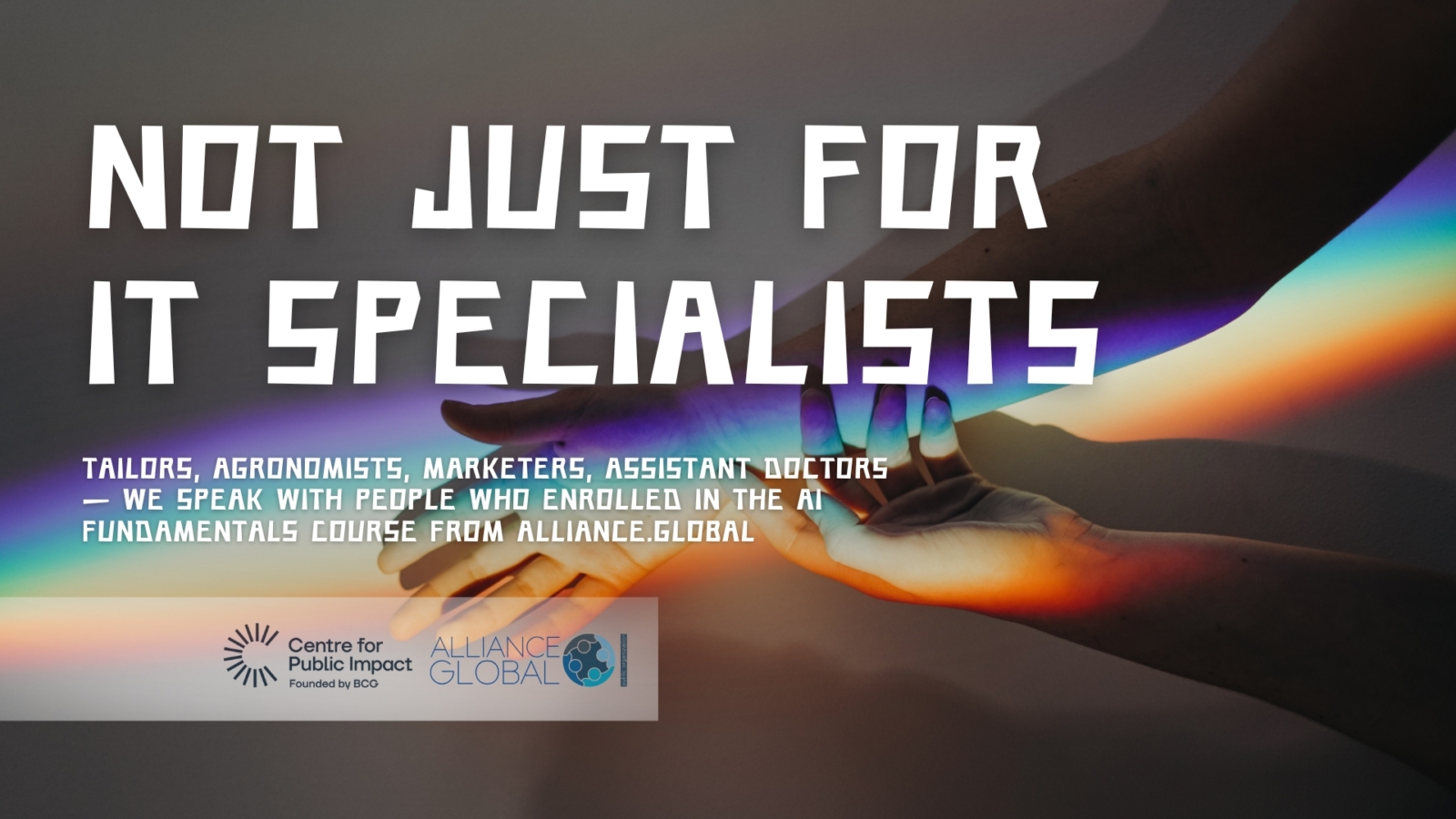Tailors, Agronomists, Medical Assistants: Meet the Participants of Our AI Fundamentals Course
24.11.2025

A tailor wants to design clothes using AI. An agronomist is searching for online work. An epidemiologist dreams of automating hospital processes for soldiers. 600 people with 160 different professions registered for a free AI course from ALLIANCE.GLOBAL - and 84% had never previously worked with artificial intelligence. Real stories and global data prove: the AI revolution belongs to non-technical specialists. And the queer community can't miss it.
Serhii from Kyiv is a tailor. Secondary education. In our AI course registration form, he wrote: “I want to try using AI to design and create clothing models.”
Volodymyr from Odesa is an agronomist. Also secondary education. His goal is straightforward: “I want to use the course to find online work.”
Iryna from Kyiv is a medical assistant to an epidemiologist. She left a lengthy comment about how Ukrainian soldiers in hospitals suffer from antibiotic resistance, how there is a shortage of medics, and how she wants to automate processes through a chatbot:
“I have heard that in some countries they use AI to simplify tasks for medics. I hope if this course matches my request, you will definitely take me – I learn quickly and I adore studying new things :)”
These are real people from our registration form for the free Google AI Essentials course, which we at ALLIANCE.GLOBAL launched for the LGBTIQ+ community.
The main takeaway from this piece: Artificial intelligence is no longer a monopoly of programmers. And we have got proof.
160 Professions. Not One of Them in Programming
600+ people from Ukraine and the diaspora registered for our course. For 200 places. Competition – almost 3 to 1.
And now for the most interesting bit. Amongst the first 190 registered – 160 different professions. From psychologists and solicitors to chefs, florists, and food technologists.
79.5% of registrants had never previously worked with artificial intelligence. Nearly all wrote: “Have not worked with it, but want to learn.” Only 12.6% had taken any training courses. And just 3.2% actually work in this field.
In other words, 84% of people who came to our course have absolutely no experience with AI. But they understand one thing: the world has changed. And they do not want to be left behind.
What People Write in the Registration Form
(names changed) Ivan, psychology student from Kyiv: “Now every specialist needs to know how to work with AI, considering the rapid development of this field. Either you learn, or you become irrelevant.”
Denys from Dnipro, marketer: “Would really love extra earnings through freelancing and to master new skills.”
Mykhailo from Kyiv, Master’s in Public Administration, wrote the most brilliant thing: “Those who don’t learn stay in one place, whilst life goes on. So to stand still, you need to run with all your legs.”
Artem from Lviv, biologist and SMM manager: “For developing educational content in biology, sex education, and in my current profession.”
Marho from Kharkiv, tourism specialist: “I want to find remote work. I reckon that in future, AI work skills will be necessary for nearly any profession.”
Tetiana from Kyiv, designer (software engineer – the only person with “technical” education in our sample): “I use it more for myself and my own goals, and it is generally useful for understanding and speeding up my work in design and learning. This skill is useful in most jobs at least from an organisational point of view.”
Global Data Confirms: Non-Technical Specialists Are Overtaking Tech Workers
Our data isn’t a fluke, and it aligns with global trends.
88% of marketers worldwide use AI daily – more than 83% of tech workers. 72% of HR professionals have integrated artificial intelligence into their work. 81.7% of journalists in 70+ countries are experimenting with generative models. 60% of teachers used AI throughout the 2024-2025 academic year.
McKinsey shows: 75% of knowledge workers globally are already using artificial intelligence. And 78% bring their own AI tools to work, not waiting for their companies to implement something.
The most important bit? 51% of vacancies requiring AI skills in 2024 were outside the technology sector – up from 44% in 2022.
In Ukraine During the War – The Same, Only Faster
85% of Ukrainian IT professionals use AI – up from 57% over a year. And 91% of non-technical IT workers (marketers, designers, HR) use AI versus 84% of technical ones.
The war, as it turns out, has accelerated digitalisation by 5-10 years. Ukraine made the biggest leap in the history of the UN E-Government Index: from 102nd place (2018) to 5th in the world (2024). The Diia app has 19.9 million users – a 30% increase since the start of the full-scale war.
The number of companies using AI has grown from 24 to over 1,000. In February 2025, Ukraine launched Diia.AI – the world’s first national AI assistant for government services for 23 million people.
How Much AI Skills Are Worth on the Ukrainian Labour Market
DOU.ua data for 2025 shows salaries for data and AI specialists:
Data Engineers – $3,840/month (biggest growth over the past 6 months). ML Engineers – $3,100/month. AI Engineers – $2,700/month. Business Analysts – $2,500/month. Marketing Analysts – $1,500/month.
But the main point isn’t in absolute figures. PwC shows: workers with AI skills earn 25-56% more compared to colleagues in the same profession without these skills. In all industries. No exceptions.
Global data from Lightcast (analysing 1.3 billion vacancies): roles with AI skills command a 28% higher salary ($18,000/year on average). And roles with two or more AI skills see a 43% higher salary.
Why the Queer Community Can’t Miss This Revolution
Our community has always been at the forefront of change. We know how to adapt, survive, and find new paths. And right now is a particularly special moment for this.
Remote work thanks to AI is a real chance for those living in small towns without safe spaces for the community. For those wanting to relocate but first need a stable income in dollars or euros. For those knackered by toxic offices where you have to hide.
Of our 600+ registrants – 30% are internally displaced persons. The war has forced people to seek new opportunities. And artificial intelligence provides them.
Mykyta from Sumy, software developer, serviceman:
“I want to understand the probability of implementing AI in military unit operations, and to have a backup plan after returning to civilian life.”
Svitlana from Znamianka, social work specialist, IDP: “I want to learn how AI can help in life, what its main functions are. Afterwards – I will be using it for planning, generating ideas, and searching for information.”
Three Myths That Stop People from Starting
Myth one: “You need to know how to programme.”
McKinsey shows: the most important skills for AI adoption are analytical assessment (30%), flexibility (29%), and emotional intelligence (27%). Programming (AI delegation/prompts) – just 21%.
Most modern AI tools are conversational interfaces. You write in text, you get results. Like chatting with a clever mate.
Myth two: “It’s expensive.”
ChatGPT, Google Gemini, Claude, Microsoft Copilot – free versions available to everyone. Prometheus – Ukraine’s largest educational platform with 2.5 million students – has free AI courses in Ukrainian.
We at ALLIANCE.GLOBAL have launched a completely free Google AI Essentials course for the LGBTIQ+ community. With financial support, access to laptops in our centres, and psychological help. Registration here.
Myth three: “AI will take my job.”
The World Economic Forum forecasts: whilst 92 million jobs may be displaced by 2030, 170 million NEW ones will be created. Net gain – 78 million jobs.
82% of workers reckon that AI will make them more efficient and productive, able to focus on higher-value work.
The reality is straightforward: either you learn, or you fall behind.
Serhii from Lviv, studying English and French philology, wrote in the form: “Now every specialist needs to know how to work with AI. Either you learn, or you become irrelevant.”
66% of managers won’t hire a candidate without AI skills. 71% will favour a less experienced candidate with AI skills over a more experienced one without them.
The window of opportunity is open right now. In a year or two, AI skills will become basic requirements, not competitive advantages. Like being able to use a computer in the 2000s.
What to Do Next
For the queer community:
We at ALLIANCE.GLOBAL have launched a free Google AI Essentials course in Ukrainian. 200 places, 8 cohorts throughout 2025-2026. With (individual) support, psychological help, and access to laptops in our centres across six regions.
We understand that 30% of our participants are IDPs. 48% need psychological support during learning. So we have created a comprehensive support ecosystem.
For everyone else:
Prometheus – free courses in Ukrainian.
Coursera – AI For Everyone by DeepLearning.AI (Andrew Ng, Stanford professor) – non-technical introduction, 6-8 hours.
Google AI Essentials – practical tools for beginners.
Elements of AI from the University of Helsinki – free in 20+ languages, no maths or programming.
News








